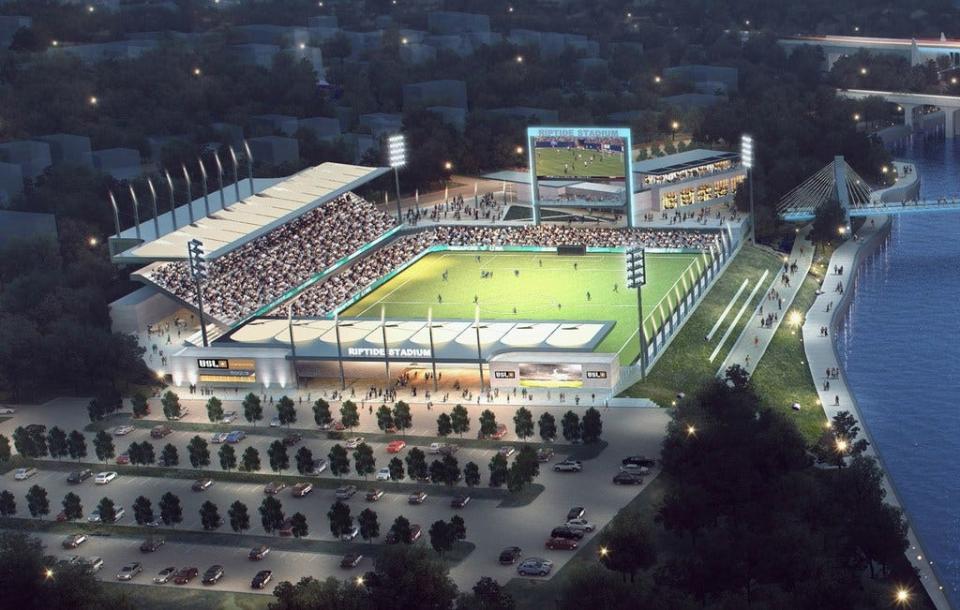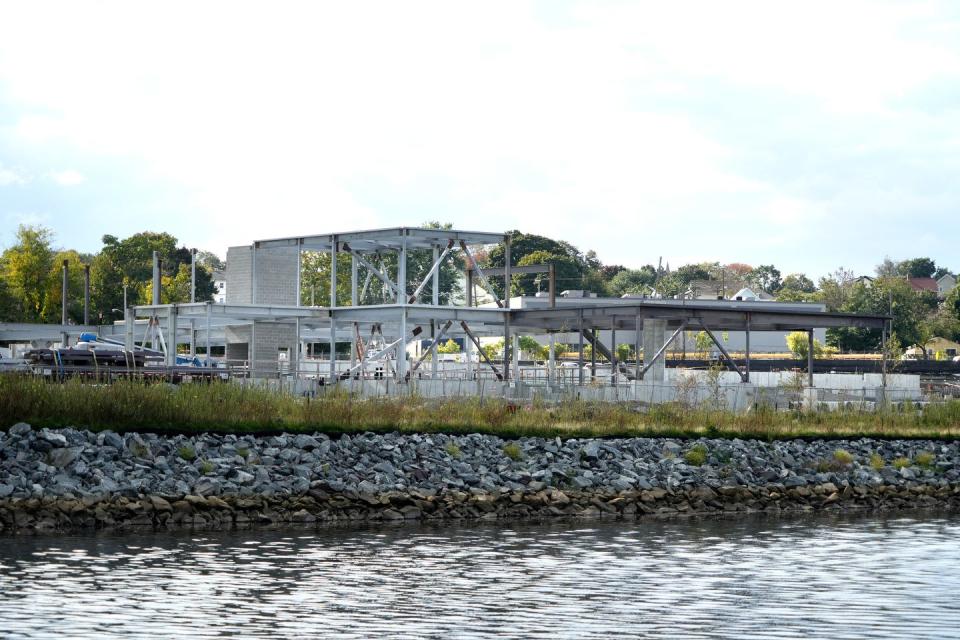The fiscal feats behind Pawtucket's soccer stadium. How the complex deal got done.
Say what you will about the cost of Pawtucket's under-construction professional soccer stadium ? and it is high – pulling the deal off in adverse economic conditions was no small feat.
Even after developer Fortuitous Partners raised the private investment it needed to restart stadium work that was paused last summer, by August the process of securing nearly $100 million in loans still lay ahead.
Facing the highest borrowing costs in more than a decade, teams of lawyers, consultants and finance experts spent weeks massaging the numbers. They added to debt service reserves, hired a new municipal adviser when the first had doubts and brought in a mysterious millionaire guarantor known behind the scenes as "Mr. Big" to reassure skittish lenders.
More: RI will ultimately pay $132M to build a Pawtucket soccer stadium. Why is it so expensive?
Then those involved in the deal sent teams across the Pacific to find investors in Asia enticed by the idea of moving to America.
Even then, there were questions.
"We understand that there is currently a $13-million gap which the developer plans to fill with [foreign investor] funding which may not be available at closing and is subject to clawback if the project does not qualify," Karen Grande, an attorney with Pawtucket bond counsel Locke Lord, wrote in an Aug. 25 group email that typified some of the concerns circulating among those putting the deal together.
Pawtucket provided that email along with more than 1,400 pages of stadium-financing correspondence ? albeit with heavy redactions ? in response to a Political Scene public records request covering the period from last May to Oct. 19 when the city redevelopment agency took the Tidewater Landing bonds to market. (The city did not charge for the documents, but redacted most attachments.)

The emails provide a window, if only a narrow one, into how financing the stadium became so complicated and expensive despite around $51 million in public assistance, not including borrowing costs.
While redaction-free correspondence may have told a different story, the publicly available email record shows little concern, at least among those working for the city, about how expensive the growing stadium debt had become. Most of the public financing costs will be picked up by the state, and by this point in the process Gov. Dan McKee's administration had effectively committed to doing whatever it took to make the stadium happen.
But there was considerable focus, and concern, on making sure that Fortuitous could get the loans it needed to open the stadium, the point at which all of the state funding will flow.
What is EB-5?
And there was scrutiny on the immigrant visa investment program known as EB-5, which the developer hoped would fill the final holes in the stadium budget.
The federal EB-5 program allows foreigners who invest in American economic development projects to legally and permanently move to the United States with their families.
Tidewater's EB-5 financing is being managed by KT Capital Group, a boutique investment firm with a background in Kazakhstan and Hong Kong that specializes in raising money from central and southeast Asia.
More: Pawtucket soccer stadium's financing is complete. Here's what's behind the $137M project
Last summer and into the early fall, finding those foreign investors was proving tricky.
Relying on EB-5 was a chief concern of Hilltop Securities in May and June, before the firm eventually quit as Pawtucket's municipal adviser in August.
"As we have discussed, it has been our experience that EB-5 funding is not a typical source of funds to finance construction of a stadium," Maureen Gurghigian, managing director of Hilltop, wrote in a June 22 letter, adding that two underwriters had said it was "not suitable" for the stadium deal.
EB-5 funding was used to help build a stadium in Orlando for the Major League Soccer team that plays in that Florida city.
But it comes with the risk that some of the investors will be found ineligible and their money clawed back.
That concern about whether $13.5 million in EB-5 funding could be relied upon continued into August.
"I know there has been considerable discussion about KT Capital in particular," Jeremy Savage, outside legal counsel for the city, wrote in an Aug. 11 email to more than two dozen people working on the deal. "As you will see, the guaranty now includes a $17 million liquidity requirement for the guarantor to account for the $13 million that KT is funding plus a $4 million contingency to address these concerns."
The "liquidity requirement" meant that the guarantor who pledged to fund stadium completion if something goes wrong have at least $17 million in cash on hand to guard against something like that happening.
On Aug. 27, Laura Radcliff, of lead bond underwriter Stifel, said that KT Capital had "received subscriptions from four families at $800,000 each, totaling $3.2M for the Tidewater project," leaving $9.8 million still to raise.
"[KT Capital] is going to Singapore, Korea and China to identify additional investors," Radcliff wrote. "... They are willing to amend the loan documents to say that clawbacks, if any, would not commence until after the project is completed and certified by Commerce."
The team of lawyers and consultants suggested a number of options to fill the funding gap that ranged from increasing the size of the other stadium construction loan, getting another loan against future EB-5 investment, raising additional equity investment and getting a loan from the guarantor.
Throughout the hundreds of emails exchanged, no one reveals the identity of the guarantor, a stadium investor with a personal net worth of at least $250 million called in to backstop the project and reassure nervous lenders. Or if they did it was redacted.
Until Aug. 25, the guarantor was being referred to by pseudonym within the group.

"Looks good. Please remove reference to 'Mr. Big' and replace with Guarantor or other term," John Simmons, the longtime former head of the Rhode Island Public Expenditure Council who was a city consultant on the deal, wrote in an email.
Flash forward to Oct. 13, less than a week before the stadium bonds were set to go to market, and changes to the terms of the prospective deal, which were redacted, apparently called into question whether KT Capital had found the EB-5 investment promised.
"Potentially adding a 4th private lender at the last minute is not a benign change," Walter St. Onge III, an attorney with Locke Lord, bond counsel on the deal, wrote in a 9:33 p.m. email. "We need to understand why this change is being made and what is going on with the EB‐5 money, which has always been a source of concern – namely is it real?"
Simmons the next morning: "It looks like they have not raised the EB-5 money."
Pawtucket Mayor Donald Grebien wrote to Simmons, Savage and the chief of staff Dylan Zelazo: "morning. Let me know what you need from me. Ty"
No response from KT Capital or Fortuitous is included in the emails, but whatever was said reassured everyone the EB-5 investment was real and the bond went to market Oct. 19.
How did Fortuitous fill the funding gap?
When completed, the 10,500-seat stadium is expected to be the most expensive soccer stadium for a second-tier team in the country, but Fortuitous found some places to trim around the edges.
More: Soccer stadium bond adviser cited 'concerns' about project before quitting. What we know.
The bond offering documents finalized last month list a $128.4-million base project budget with another $10.5 million in "supplementary" spending to be added "if and to the extent additional funding is available after the closing date." (Separate estimates in the documents peg the project cost at $137 million.)
The items include a "series of video boards to be installed around the stadium as well as additional furniture, fixtures and equipment." Fortuitous also agreed to defer its developers fee.
The deal is set up so KT Capital loans Fortuitous money against its EB-5 investments. By the time the stadium bonds were sold in February, KT Capital had provided $8 million for the project, but that total could rise to $40 million, according to the bond memo.
Who are the other lenders involved?
The bulk of the private debt for the stadium is coming from more traditional sources.
Fortuitous is getting a $28 million construction loan through the Commercial Property Assessed Clean Energy (C-PACE) program.
C-PACE allows developers whose projects hit energy efficiency targets to borrow money secured by a lien instead of a traditional mortgage.
The stadium insulation, field lighting, toilets and urinals are all designed to exceed building code for efficiency, according to an energy audit provided by the Rhode Island Infrastructure Bank, which is responsible for making sure the deal complies with all the C-PACE regulations.
C-PACE is attractive to lenders who might not be willing to make a conventional loan on the stadium because, if there is a default, the debt service is attached to the property like a municipal property tax lien and any entity that takes it over would still have to pay it.
Despite that, of the $28 million C-PACE loan Fortuitous will only get $21.1 million to use on the stadium, with $6.9 million going to borrowing costs.
In addition to backing the stadium bond, the state also granted Fortuitous $14 million under the Rebuild Rhode Island tax credit program.
Of the $14 million, $11.7 million are tax credits and $2.3 million are sales tax rebates on construction materials that the developer can claim after the stadium is done.
Fortuitous sold the $11.7 million in tax credits for $9.1 million (78% of value) then took out a $10.8 million loan against them with Lincoln Savings Bank.
Why take on more debt?
The Rebuild tax credits are issued over five years, according to Commerce Rhode Island spokesman Matthew Touchette.
Fortuitous needed the money up front to finish the stadium. (This financing is also why Fortuitous could not take advantage of a Rebuild provision that allows recipients to cash in their credits for 90% of face value if they can't sell them for that much on the open market.)
What are the risks?
Assuming Fortuitous completes the stadium, the bond documents indicate that perhaps the biggest risk of the deal to investors is political.
McKee has pledged to request enough to pay the $130 million in debt service payments projected over the next 30 years, but the General Assembly holds the purse strings.
"... There is a risk that the General Assembly could in the future base its willingness to appropriate amounts to pay debt service on the [stadium] Bonds ... on the success of the [stadium project] including the successful operation of the Stadium," the bond offering memorandum says.
History has shown lawmakers will be loath to default on a state debt even if the underlying project it funded has gone sour, most recently with 38 Studios.
Another risk is the possibility that, due to disappointing ticket sales or some other reason, Rhode Island FC runs into financial trouble and Fortuitous doesn't make the payments on its Rebuild tax credit loan or EB-5 loan.
Then what happens?
Both the tax credit lender, Lincoln Savings Bank, and the EB-5 lender, KT Capital, could foreclose on the stadium if Fortuitous defaults.
Whether they could find another buyer who would operate a USL Championship soccer team there is unclear.
But that's not on anyone's mind in Pawtucket now.
Rhode Island FC is set to play its first ever match against New Mexico United on Saturday in the team's temporary home at Bryant University.
And construction continues on the Pawtucket stadium to get it ready for games there next March.
This article originally appeared on The Providence Journal: Pawtucket soccer stadium financing was no small feat: Political Scene
